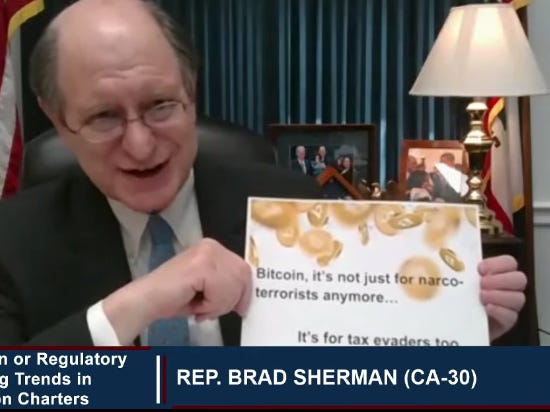Hi all 👋
I’ve enjoyed an unintended bimonthly cadence so I’ll continue experimenting with it for a bit.
My team is looking for a Sr. Public Policy Manager and Product Counsel! BlueVine actually has a ton of openings right now beyond legal and compliance, so come apply!
Afterpay Faces Class Action Lawsuit
An Afterpay customer filed a class action lawsuit against the company alleging deceptive marketing practice.
The gist of the claim is Afterpay targeted consumers by promising a way to make purchases with no fees, but customers’ banks end up charging non-sufficient funds fees (aka, fees charged when your account is charged for more than what’s in it) and overdraft fees when the company later tries to charge customers’ accounts.1
SEC Announces Regulatory Agenda
The SEC released its 2021 regulatory agenda. The focus will be: ESG disclosures, cybersecurity, insider trading rules, SPACs, proxy voting, and share repurchases.
Conspicuously absent is crypto guidance or updates to accredited investor standards and private offerings.
CFPB MLA Exam Authority
Quick background: the Military Lending Act (MLA) protects military borrowers from predatory lenders. It’s most known for limiting interest (APR, technically) to 36%, but also includes other protections.
Before 2018, the CFPB had been examining financial institutions to make sure their lending practices complied with the MLA. But in 2018, the Bureau stopped based on the belief it didn’t have authority to do MLA exams.
Well this week the CFPB issued an interpretive rule saying it does have that authority.
TL;DR: consumer lenders can expect MLA exams from the CFPB in the coming years.
CFPB Aid on Digital Payment Complaints
The CFPB issued a Compliance Aid to answer open questions about how the EFTA applies to complaints of unauthorized or erroneous digital transfers (see this TL;DR for EFTA details).
Some key takeaways:
Financial institutions (FIs) can’t deny a customer’s attempt to limit liability for an unauthorized transaction if the customer was defrauded into providing account info to someone who transferred funds.
FIs can’t consider a customer’s negligence when determining if a transfer was unauthorized (e.g., writing a PIN on a card).
EFTA compliance takes priority over payment network rules and obligations.
“Compliance Aids” are a relatively new tool the CFPB has used starting first in early 2020. They’re not formal rules, but give compliance folks practical guidance.
Crypto News
Lots going on in crypto the past two weeks. For folks less interested in crypto, you can skip down to the “Elsewhere” updates…
Texas Issues Crypto Notice
The Texas Department of Banking issued a notice saying crypto safekeeping is just a modern form of traditional custody services. Aka, Texas banks already have authority to custody crypto assets under existing Texas law.
The notice also indicated banks can use third-party service providers as long as they have a strong risk management program.
Fun fact: Texas has the most state-chartered banks of any state.
Basel Committee Proposes Crypto Rules
The Basel Committee (a global standard setter for bank regulation) released proposals for how banks should view crypto from a prudential regulation point of view.
“Prudential” regulations are aimed at making sure a banking system is “safe and sound.” Aka, can it withstand unexpected shocks?
The Basel Committee’s proposal sets different standards based on the type of crypto involved:
Tier 1: This tier can mostly be treated under existing bank prudential standards. Think: tokenized real-world assets and stablecoins; crypto that is inherently less risky than…
Tier 2: “Higher risk” crypto that is subject to higher prudential standards. The Committee cited Bitcoin as an example of Tier 2. For this tier, a bank would need to hold $1,250 in reserves for $100 of crypto held.
Couple Suing IRS for Staking Taxation
A couple is suing the IRS for a refund of taxes they paid on Tezos tokens earned from staking.
The couple is arguing that tokens created by staking are “new property” they created, not compensation, and that new property has never been taxed as income in the US.
The IRS has yet to issue guidance on how the agency views staking.
DeFi Enforcement
CFTC Commissioner Dan Berkovitz gave a speech recently where he noted DeFi markets may be illegal under the Commodity Exchange Act.
Typically, futures contracts must be traded on a designated contract market (DCM), which is regulated by the CFTC. Any swaps (like what?) must also be traded on a DCM or registered swap execution facility (SEF).
And, of course, DeFi markets are not registered as either DCMs or SEFs.
TL;DR: You can expect DeFi-focused enforcement in the coming years (but that’s not surprising, really?).
Elsewhere...
💸 NACHA issued a request for comments on early fund access products (like early wage or social security access).
👀 Colorado got me a birthday present and passed a comprehensive privacy law. It’s the third US state to do so.
₿ The SEC has further delayed making a decision on Kryptoin’s Bitcoin ETF to late July.
₿ El Salvador voted to treat Bitcoin as legal tender.
🔨 Lina Khan became chair of the FTC. She’s known to be a big tech critic with an eye towards more aggressive antitrust enforcement. Khan is also only 32 and graduated from law school the same year I did. So, uhh, that makes me question what I’ve accomplished.
🤓 Massachusetts set up its own FinTech innovation hub.
😳 Texas is creating a wall of cybersecurity shame; Governor Abbott signed a law that creates a public record of data breaches affecting TX residents.
💸 The Fifth Circuit ruled that a global payment services company (MoneyGram) does not count as a bank under the US tax code, and so cannot claim tax benefits that banks would typically get.
💸 An early wage access (EWA) study found that EWA providers can recoup advances at least 97% of the time, and users pay an average 2.57%-4.69%.
🤓 The FDIC announced an upcoming tech sprint aimed at finding new tech to meet the financial needs of the unbanked.
🎉 Juneteenth is now a federal holiday!
₿ Block.one agreed to pay $27.5M to settle an SEC suit based on the company's ICO (aka, sale of unregistered securities) back in 2017-18
₿ Congresswoman Waters announced she has organized a crypto task force of Democrat house members. The membership includes Rep. Sherman, so, uhh…
Sui Generis
The last time the US passed a federal antitrust law (1914), the horse and buggy industry was competing with newfangled automobiles.
File under “unintended consequences:” Colorado is the only state that has a law saying companies must list salary range in job listings. It was meant to combat gender wage gaps. Great intention, but now companies are advertising remote jobs for anyone in the US except those who live in Colorado. Whoops.
Sign the petition to support Jeff Bezos buying and eating (yes, eating) the Mona Lisa.
About
Hi. I’m Reggie. I’m a lawyer at BlueVine. If you want to connect, are fundraising, or are on the FinTech job hunt, come say hi on Twitter or send an email: fintechtldr@gmail.com.
Any views expressed are my own (well, sort of? I mean, they’re based on laws and regulations, so they’re not really “mine”?). Nothing here is legal or financial advice.
Here are the foundational FinTech laws and regs if you want a closer look at anything.
Good luck, ZC.







